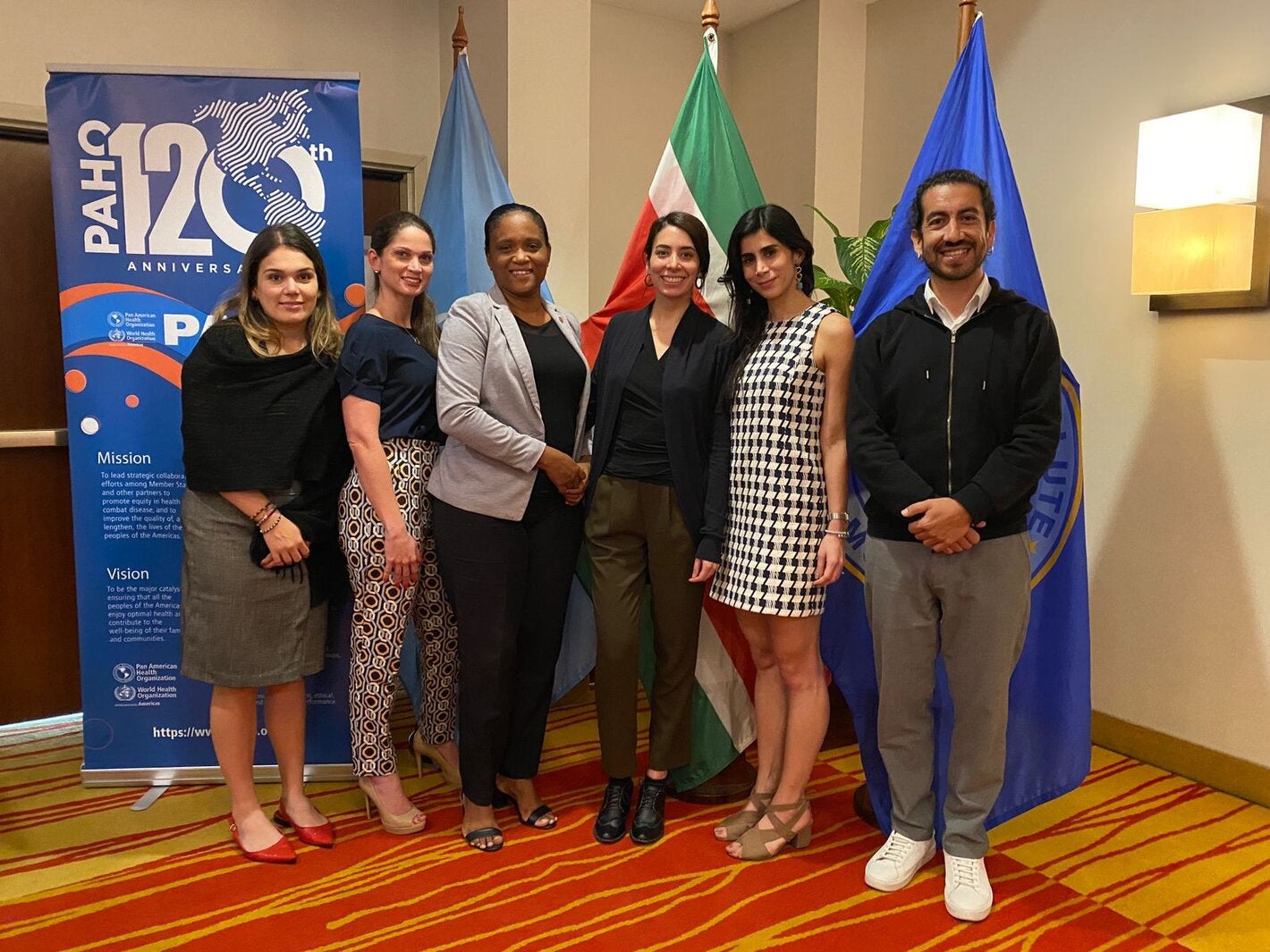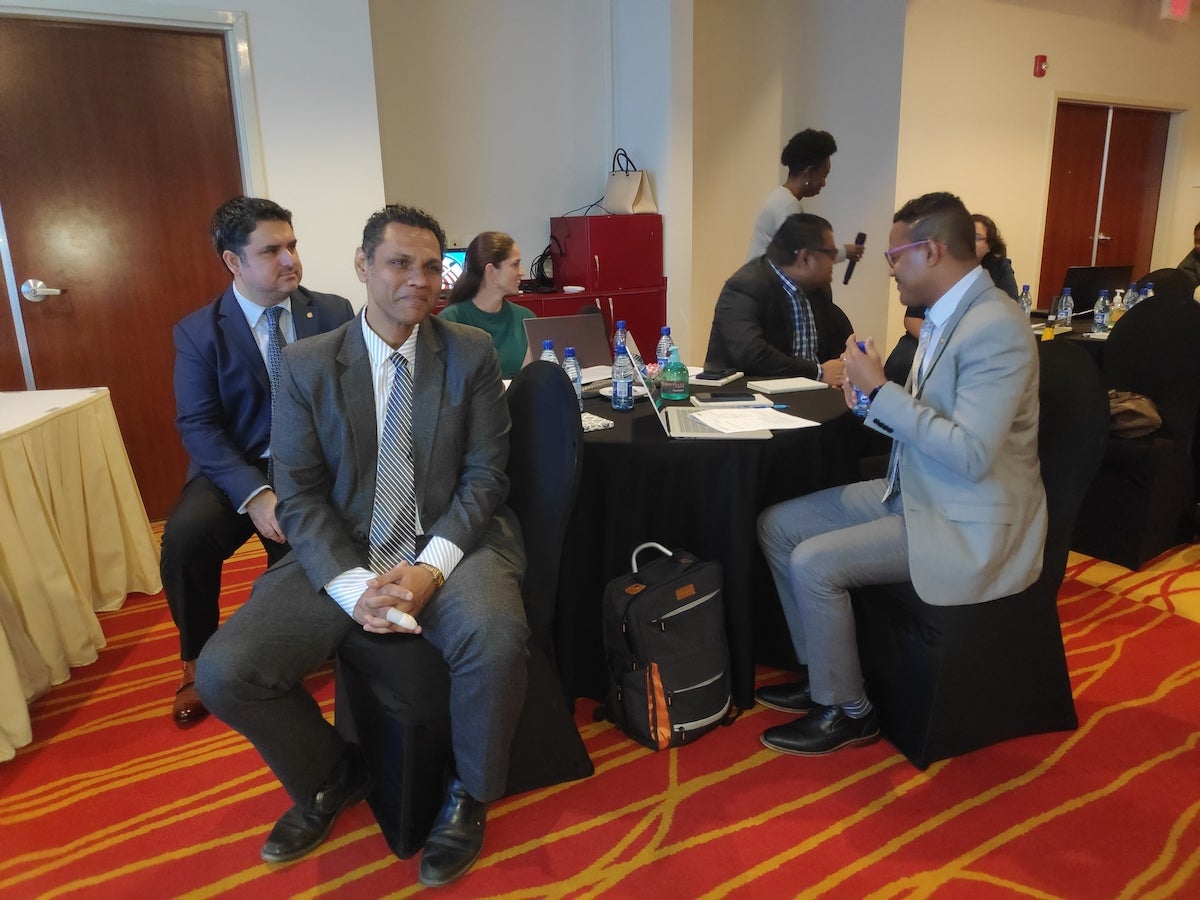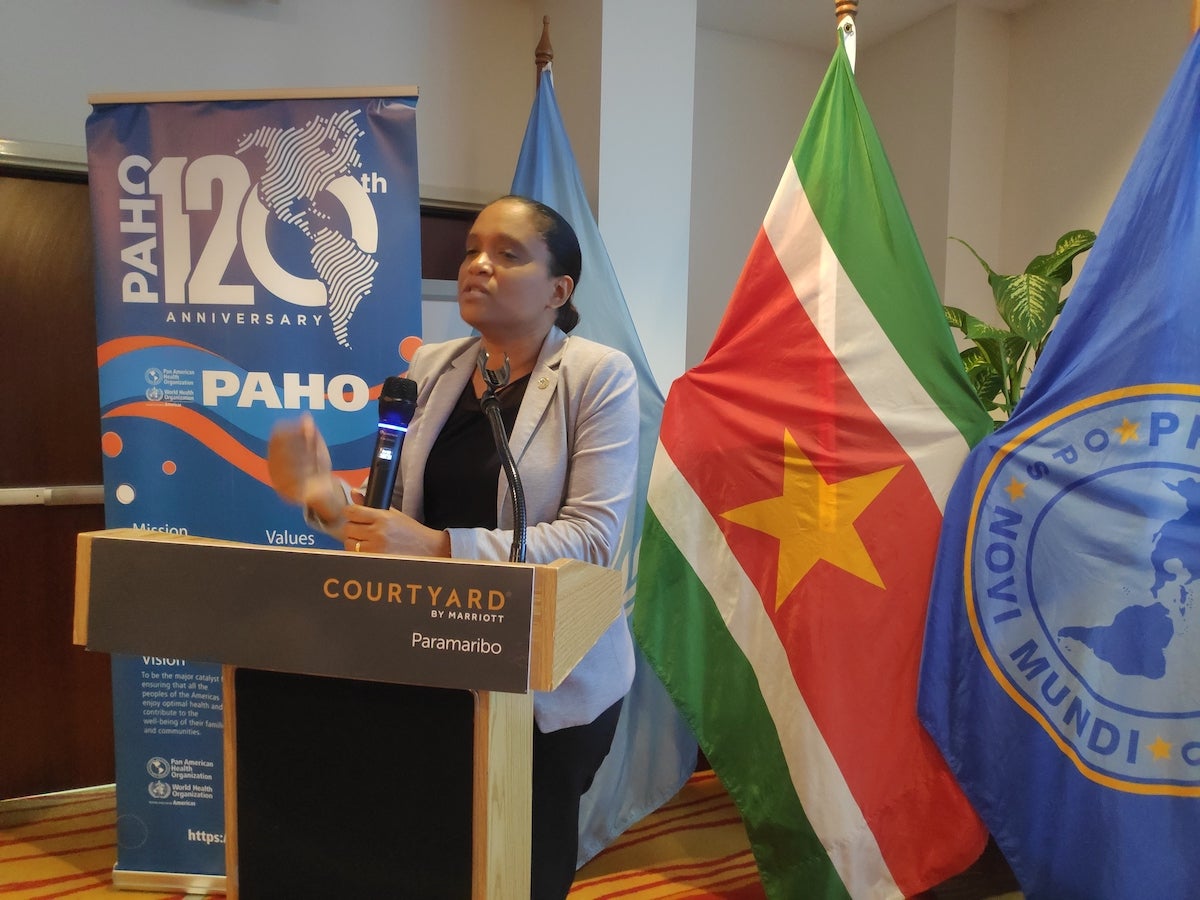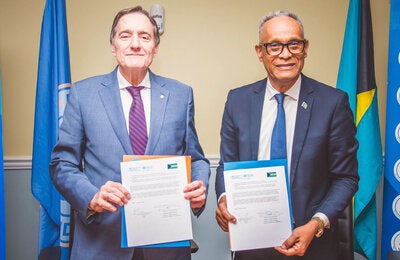
PAHO/WHO Nutrition & Social Marketing for the risk factors unit and NCDs Consultant Maria Bustamente, PAHO/WHO Country Consultant Suriname Joanna Baank, PAHO/WHO Suriname Technical Officer Dr. Wendy Emanuelson-Telgt, PAHO/WHO Regional Consultant Ana Larranãga, PAHO/WHO Regional Consultant Carolina Mejia Toro, PAHO/WHO SDH Health Promotion and Social Determinants Dr. Hugo Vasquez during the two-day workshop
Suriname, February 08, 2023 (PAHO) – The Pan American Health Organization promotes, coordinates, and implements technical cooperation activities directed to the prevention and control of non-communicable diseases (NCDs), related risk factors, disabilities, and mental, neurological, and substance abuse disorders that are sound and appropriate for the local culture and society. NCDs are the number one cause of death and disability worldwide and in Suriname.
PAHO recognizes the commitment made by the Ministry of Health in Suriname to strengthen their NCD response to this growing burden, and therefore hosted a two-day workshop for Policymakers that can Contribute to addressing issues related to social determinants of health, such as experts of the Ministry of Health & Medical Mission.
The purpose of this workshop was to (1) raise awareness and dialogue on the impact of social conditions on exposure to various risk factors for the development of noncommunicable diseases in Suriname, (2) to identify needed interventions and areas of opportunity and linkages to support the better addressing of the Social Determinants of Health (SDH) and the reduction of inequities in the context of chronic noncommunicable diseases in Suriname, and (3) to present the Pan American Health Organization's efforts on incorporating the Social Determinants of Health approach in tools for health decision makers and care providers and gather feedback from attendees, through the new Social Determinants of Health Module in the technical package for cardiovascular health in primary care settings, HEARTS.
The workshop was opened by Dr. Rakesh Gajadhar Sukul, Director of Health, Ministry of Health Suriname, who informed attendees on the current situation of NCDs in Suriname, along with the progress that is being achieved, and the efforts undertaken by the Ministry of Health and National policies in place.
“A strong multisector collaboration is crucial for healthy lifestyle promotion and risk factor reduction. I hereby once again welcome you all and appreciate your presence. As a health sector and as a nation we have to join hands, be accountable, and share the responsibility to tackle the burden of NCDs and their risk factors. Special thanks to the PAHO/WHO, who made this workshop possible through their support.”
The Acting PAHO/WHO Representative Alejandro Caballero welcomed all participants as he mentioned
“PAHO applauds the commitment of the Ministry of Health in Suriname to strengthen the NCD response and is very pleased to host this workshop. Therefore, like to wish you a productive workshop and look forward to the outputs as our technical officers from the Suriname office and Headquarters will facilitate during these two days.”
The workshop was facilitated with presentations and instructions from PAHO colleagues from Washington, PAHO Nutrition & Social Marketing for the risk factors unit and NCDs Consultant Maria Bustamente, PAHO SDH Health Promotion and Social Determinants Dr. Hugo Vasquez, and PAHO Regional Consultant Carolina Mejia Toro and Ana Larranãga. Furthermore, this two-day workshop is part of a collaborative effort to address NCD's preventable risk factors in Colombia and Suriname with social determinants of health (SDH) approach.
To provide workshop attendees with evidence of the impact that people's living conditions have on health, PAHO Consultant Dr.Hugo Vasquez highlighted the importance of incorporating this systemic and broad vision in policy efforts aimed at the management and prevention of chronic diseases to move towards better outcomes, PAHO NCDs Consultant Maria Bustamante followed-up with the connection between risk factors and social behavior change from the individual, collective and advocate perspective including how to use social marketing tools.
PAHO Regional Consultant Carolina Mejía Toro and PAHO Country Consultant Joanna Baank presented the main mapping findings on the existing tools (policies, programs, actions) to address NCDs in Suriname to examine their strengths, limitations, and opportunities from the perspective of equity and the SDH. PAHO Regional Consultant Ana Larrañaga presented PAHO's efforts to strengthen action tools for health care providers and decision makers, such as the HEARTS package for CVD and NCD care, focusing on social determinants of health and equity.
Workshop participant and Deputy Director of Medical Mission Dr. Maureen Wijngaarde mentioned that “the timing of this workshop is perfect, as the Ministry of Health and its stakeholders are currently working on the correct implementation of the HEARTS initiative in Suriname. We know that to achieve a good implementation of the HEARTS initiative, a crucial response to the SDH is critical. By understanding the current situation about SDH, we can work together with stakeholders outside the health sector to achieve our goals.”
The workshop also included an interactive and teamwork session, the goal was to identify with participants the tools and interventions missing in the mapping exercise and which are vital to addressing NCDs in Suriname through an SDH/equity-based approach. To present PAHO's efforts to strengthen action tools for health care providers and decision makers, such as the HEARTS package for CVD and NCD care, focusing on social determinants of health and equity.
Lastly, the 2-day workshop concluded with a presentation on how to create a national route for action to address NCDs, risk factors, and related inequities by using the framework of action of SDH and the baseline information collected through the previous exercise.





